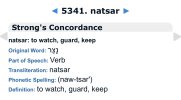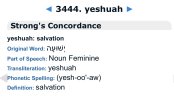Let's stick with what we know.
So far, so good. Agreed.
We know Paul was a top Jewish scholar, and therefore almost certainly a scholar of Hebrew with a Hebrew mindset - a "Hebrew thinker" as you have pointed out.
Again, so far, still so good.
And all the texts we have include not only him, but every other New Testament author, citing extensively from the LXX.
Full stop. We do NOT know whether any of those (I would question particularly Shaul/Paul, Yochanan/John, Kefa/Peter, for starters) actually quoted from their (now no longer extant) Torah scrolls and "TNKH," what Yahushua also called the 'torah and prophets,' in
Hebrew or not!
Ponder this:
IF they quoted from a pre-Masoretic text, perhaps the same or copies of texts TRANSLATED by The Famous 72 a few centuries earlier, and those letters were later copied and re-copied and re-copied into Greek - wouldn't you argue at least as persuasively that IN GREEK that original Hebrew would appear IDENTICAL to the oh-so-perfect translation of the LXX? Don't forget that NO 'original'
copy of the Septuagint even survives from centuries AFTER those supposed quotations!
What we know is that huge variations exist in the many, many variants of 'new testament' texts (to the point where most English versions of the Bible spend at least a page or two on source information.) My NKJV 'Study Edition', for example, says, "Over 5000 Greek, 8000 Latin, and many other manuscripts in other languages," attest to the
integrity of the writings. They go on to emphasize that "other manuscript differences...should not overshadow the overwhelming degree of
agreement which exists" among these ancient records.
Many others have made what I consider a virtually iron-clad case that Revelation was Written by John in the language(s) he and his Brother spoke...Hebrew, and Aramaic. For just one easy example, "I AM the Alef Tav" has FAR more meaning, on multiple levels, in Hebrew than "the alpha
and omega" ever could. (It ['
et'] is a fundamental concept in Hebrew, which has no Greek equivalent.)
Likewise, Matthew was almost certainly written originally in Hebrew, and translated later. No original copies of EITHER version survive. But there are both Hebrew and Aramaic renderings that do, and the oldest (sometimes called "Shem Tov's Matthew) was the subject of an extensive study by a Dead Sea Scrolls translator I very much respect, Nehemiah Gordon. (And part of the topic of my related midrash on this past Sabbath, which I will link below here as well.)
And let me again re-emphasize this: I am
NOT claiming that the LXX is "not an accurate translation". But I continue to contend that there are elements, and information content, that are simply impossible to translate, period, at least not without volumes of additional information:
All the actual evidence we have is that the New Testament writers supported the use of the LXX. And the fact that Paul was a "Hebrew thinker" only reinforces this, because even he, likely knowing the scriptures well in both languages, approved the LXX as an accurate rendering of the meaning into Greek.
I "approve" of the KJV as an "accurate rendering" of the meaning into English. That does NOT mean that I believe it to be error-free. (It is not.) It does not even mean that there are not important points that have been "lost in translation," and require additional supporting information to understand.
Another example: If I say some guy was "born on third-base and thinks he hit a home run," most American English speakers laugh. (Unless they've heard it a hundred times before.) Most Europeans, even many who speak English fluently, would have a puzzled look. (How about Down Under?) To explain something that took less than 50 characters to express would probably take a full page to not only TRANSLATE, but put in proper, baseball-literate, cultural context. And a merely 'accurate rendering' may, or may NOT, capture the real original intent.
Lastly, and leastly even, if you wrote a "Letter to the Romanians," wouldn't you write it in Romanian?
Here is the link I mentioned:
Parsha “Acharei Mot” (Leviticus chapters 16 through 18) is the regular reading for this week, following the Feast of Unleavened Bread. But we did take a look at that week, Mark decided …

hebrewnationonline.com






